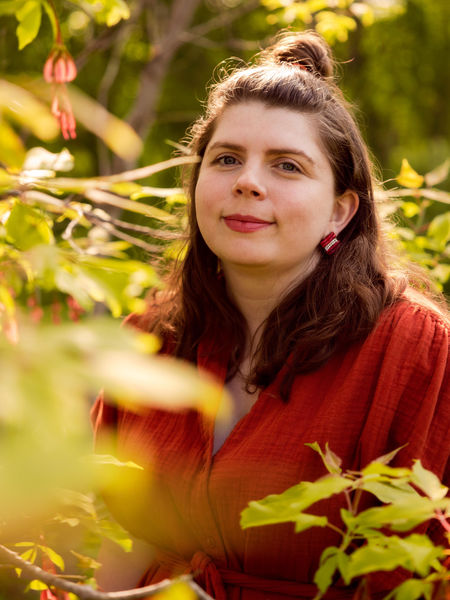Jess Taylor Confronts and Then Says Goodbye to the Past in her Compelling Debut Novel
Memories of childhood, and the realities of what remains in the here and now, are twin prospects that everyone must face and contend with in their lives. Flights of imagination and acts of play often take on new and more deeply felt meaning as people age, and who they were shifts into who they are.
Acclaimed author Jess Taylor, who already made waves in recent years with her short fiction, has truly arrived with her debut novel, Play (Book*hug Press). Using all of the precision and skill that went into her story collections Pauls and Just Pervs, Taylor tells the story of Paul (Paulina), who we find struggling with PTSD after the death of her beloved cousin, Adrian.
Long before, when they were children, Paul and Adrian created The Lighted City, an imaginary world that served as their escape from the troubles of their young lives. But, this fantastical place carries its own dangers, and a history that Paul is only just beginning to reckon with as she deals with the difficult trappings of adulthood. To come to terms with all that has happened, Paul must return to The Lighted City and confront her true past and its effect on the present.
We're delighted to share this Long Story Novel Interview with the Jess Taylor, and delve deeper into the author's compelling debut:
Open Book:
Do you remember how you first started this novel or the very first bit of writing you did for it?
Jess Taylor:
Paul, my protagonist in Play, is actually the main character of three of the stories in Pauls. When I was writing those stories, I knew she had a traumatic past that she hinted at. As a character, she was someone who was not very direct… she talked around things and wouldn’t look at things straight on. I wondered, What happened to you? What would happen if you told your story in full?
A lot of the earliest pieces, starting in 2014 around the same time I was wrapping up Pauls, were little pieces about Paul and her cousin, Adrian, and their childhood. I’ll often do background writing like this for stories or novels to understand a character. I loved her lyrical voice and realized, There is something more here that I can get really into. That being said, it ended up being a very difficult book to write and took me 10 years from those first pieces to publication.
OB:
How did you choose the setting of your novel? What connection, if any, did you have to the setting when you began writing?
JT:
The novel has three strong settings: Toronto, Ontario; Caledon, Ontario; and Vancouver, British Columbia. I grew up in Caledon, Ontario and I often set childhood scenes in Caledon. It was a beautiful place to grow up, known for its “rolling green hills”, forests, and fields. My parents’ place backs onto a bird sanctuary and protected conservation land, so I spent a lot of time exploring outdoors. It was also a very isolated, lonely place to grow up in a lot of ways and that emotionality is present in my work and in the setting. I feel even if I don’t write about Caledon directly, that the early exposure to nature will always be something I write about.
Your CanLit News
Subscribe to Open Book’s newsletter to get local book events, literary content, writing tips, and more in your inbox
My story collections are often filed under “urban fiction” because I write a lot about Toronto, where I’ve lived since my early twenties. One of the things I love about this city is how each village in the city has a different vibe, so you can really cover a lot of different settings while still being located in an urban centre.
Vancouver, to me, has always been the promised land. When I was growing up, I dreamt of going to school in British Columbia to get as far away from Caledon as possible, but family, a band I was in, and a relationship kept me tied to Ontario. It’s a place I always still fantasize about living, like my protagonist, Paul.
OB:
If you had to describe your book in one sentence, what would you say?
JT:
Thematic: Play is about the beauty and danger in the imagination.
Plotty: When Paul (Paulina) Hayes begins therapy to finally try to heal from her PTSD, she is thrust back into two traumatic time periods in her life: when her cousin Adrian died by suicide in 2016 and the childhood games that tied them dangerously together.
OB:
What was the strangest or most memorable moment or experience during the writing process for you?
JT:
Because writing this novel spanned ten years, I had so many experiences while writing it. There are a few major ones that stick out to me and all involve the collaboration and care of other writers and friends.
Early on in the process, I really struggled with the novel’s structure. The story was always planning to be told with some sort of innovative structure – originally I was going to do a series of monologues throughout the narrative, like stories within the story; then there was a parallel crime storyline; then finally I reached the structure we are in now, which tells the story across three intersecting time periods: Paul’s childhood in the 1990s-early 2000s, 2016, and Paul’s present in 2025. Although I went through a lot of schooling for creative writing, a lot of the instruction focused on the short form, and with mostly experience writing short stories, I was kind of at a loss. My writing friend, Sofia Mostaghimi, had recently taken a course on script writing which focused on structure. She came over and together we mapped out the plot points of an early draft of Play on Bristol board.
In 2018, when I was a pedestrian hit by a car, Sofia also printed my novel draft for me, revised and in its new structure, and put it in a binder so I could work on it in the hospital. She would visit before work at 6 a.m. and she would write while I went through and made notes on my draft (I was unable to write for a time).
After this accident, I was approached by James Davies about applying to the Writer’s Trust Woodcock Fund, a fund that helps writers going through hardship. I still don’t know who put him on my trail, but I’m so grateful. Naben Ruthnum and Spencer Gordon wrote letters of support. Being awarded funds from the Woodcock Fund helped my recovery and helped me get back to writing Play.
I was also lucky to have great editors later in the writing process, who really helped Play come together and who had wonderful conversations with me about the subject matter, form, structure, and characters: Linda Pruessen, Meg Storey, my husband Craig Calhoun, and Catriona Wright.
OB:
Who did you dedicate your novel to, and why?
JT:
The novel is dedicated “To the past, Goodbye!” It captures both Paul’s story and also my own feelings about anything that has ever held me back in life. While writing Play, I also found it so hard to move on with another novel project (I managed to write Just Pervs simultaneously as a procrastination project). It felt like Play was the book I needed to get out before moving onto the next thing. Once I placed Play, I began my second novel Experiencer, which I found a lot less difficult of a writing experience.
So now that the book is out in the world, I am able to enjoy my present and look to the future.
_________________________________________
Jess Taylor is a Tkaronto (Toronto) writer and poet. She is the author of Pauls, the title story of which won the 2013 Gold Fiction National Magazine Award, and Just Pervs, a finalist for the 2020 Lambda Literary Award in Bisexual Fiction. Her story “Two Sex Addicts Fall in Love” was longlisted for the 2018 Journey Prize. Play is her debut novel.







